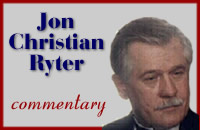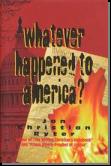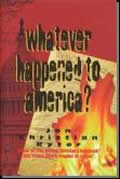Other
Ryter
Articles:
FDR's 'WAR TIME' NATIONAL EMERGENCY EXPERIMENT IS OVER FOR ANOTHER YEAR
By Jon Christian Ryter
October 30, 2003
NewsWithViews.com
At 2:00 a.m. Daylight Savings Time ended for another year as most Americans turned their clocks back before they went to bed last night. A few, of course, forgot and went to church this morning an hour early. None of them will likely arrive at work tomorrow an hour early. Even the dumbest of us aren't really that stupid.
And because, as a nation, we've been living with Daylight Savings Time for sixty years, few Americans wonder how the practice began or why it is still observed today. They just accept it as a fact of life--like pimples on the face of an adolescent--and go about their business, grumbling each spring when they lose an hour of sleep but looking forward to what they mistakenly believe is an extra hour of daylight at the end of the day.
We observe Daylight Savings Time today because of...well...habit. Nothing more. Not only does Daylight Savings Time not "save" anything, in today's communal lifestyle it actually costs every American a few cents to a buck or more a day during the summer months, and it consumes valuable crude oil that would not be consumed if Daylight Savings Time went the way of the proverbial dinosaur. Daylight Savings Time is like any of a number of nasty old habits we had as kids--like wiping our runny noses or food-covered mouths on our shirt sleeves--nasty habits that most boys continued until they became embarrassed by it--usually on their first dates (and, with that girl, the last one).
We still observe Daylight Savings Time largely because the FDR-mentality socialists tell us it must be a money-saving proposition or else FDR would not have created it in order to save millions of gallons of crude oil that were desperately needed by the military during World War II. In reality, the studies done during the 1920s and 1930s suggested America would save about 1% of its electricity consumption by observing Daylight Savings Time throughout the summer months.
The concept of stealing an hour from the morning and adding it to the evening did not originate with FDR. It originated in the fertile mind of Benjamin Franklin. Franklin was one of those scientific experimental types whose mind worked better at night than in the morning. Franklin realized that he slept less in the summer because the sun rose earlier. Because it did, he arose earlier. He concluded that if "time" was adjusted to accommodate the sun, the American people would use less lamp oil since, as a general practice, they rose with the sun and retired shortly after the sun faded below the horizon. The colonists themselves, however, never really bought into Franklin's time-saving scheme. It would be 1918 before the Utopians in the Wilson Administration enacted the Uniform Time Act of 1918 in order to conserve on oil used to generate electricity due to America's war effort.
The American people as a whole did not like Daylight Savings Time. When the war ended, so did America's first grand experiment with "time shuffling." Except, the farmers liked it. It made sense to them. They were up with sun anyway, and they were generally in bed shortly after dusk. Stealing an idle hour in the morning and adding that hour to the end of the day made practical sense to them.
In that era between the great wars, "time chaos" resulted between those who liked "time shuffling" and those who wanted the government to leave their day alone.
Daylight Savings, like gas and food rationing, were among the austerity measures implemented by the Roosevelt Administration to get America through the war years. On February 2, 1942 Congress passed an updated version of the Uniform Time Act. Roosevelt's spinmeisters called Daylight Savings Time "War Time." Once again, the experts agreed that Daylight Savings Time would save about 1% of the oil used to generate electricity. That oil would fuel a lot of airplanes, a fleet of ships or several tank battalions. In wartime, it was an austerity measure that made sense.
Daylight Savings Time was a good idea then because America was largely an agrarian society. Over 65% of the American people lived in rural or quasi-rural settings. They were either farmers or they supported the agricultural community. When the war ended, Roosevelt's grand experiment with time manipulation ended on September 3, 1945. America returned to "standard" time.
But the utopians were absolutely convinced that the savings they gleaned in agrarian America were applicable in urban America, and they were determined to continue the experiment. Only now, more convinced than ever that Daylight Savings Times saved electricity and oil because it did in 1918 and 1942, they no longer felt it was necessary to invest the time to see if any energy savings of the war years in the early 20th century existed in contemporary America at the gateway of the 21st century.
They continued to push for Daylight Savings Time each spring, calling FDR's "War Time" "Summer Time." In the farm states, Daylight Savings Time was a welcomed way of life, and at the end of March each year it was implemented. This played havoc on the States that did not observe it, particularly with people traveling from State-to-State. Many times travelers had trouble determining what time it was where they were at. They were doubly stigmatized when they crossed from one time zone into another, not knowing if the time changed one or two hours--or not at all.
In 1966 Lyndon B. Johnson signed The Uniform Time Act of 1966 into law, and on April 12, 1966 Public Law 89-387 became the law of the land. On the last weekend of March, the nation would set their clocks back one hour. States straddling time zones had the option of changing time zones rather than adjusting their clocks.
Again, the utopians insisted they were conserving valuable fossil fuel by stealing an hour of darkness in the morning and adding an hour of light at the end of the day. As American became enmeshed in Vietnam and Richard Nixon began fighting Islamic extremists in the Middle East who formed OPEC to bring America to its knees, his advisors suggested to him that a 1% to 2% savings in the consumption of oil could result if America was placed on permanent daylight savings. On January 4, 1974 Nixon signed the Daylight Savings Time Energy Act of 1974 into law. It would be the grandest time shuffling experiment of all times because it mandated the nation go on daylight savings--not just for the summer months, but year round. After one season America had enough and demanded an end to the Daylight Savings Energy Act. Nixon's grand experiment died on April 27, 1975.
If we were still living in the agrarian communities of the early 20th century, then there might be some justification for daylight savings. However, the lifestyles of Americans have changed dramatically over the past one hundred years. We are no longer an agrarian society. We no longer go to bed when the sun goes down. We are much more nocturnal than our parent and grandparents. We burn the candle at both ends--rising earlier and going to bed later, thus consuming more electricity both in the mornings and in the evenings.
Thus, that 1% savings in electricity our grandparents and great grandparents produced for the "war effort" both in 1918-19 and 1942-45 does not exist in the first decade of the 21st century. We now consume about 50% more power to fuel not only the heat and lights in our homes, but electricity for our electronic gadgets and for the air conditioning that cools our homes 24 hours a day.
In addition, during the spring and early fall, daylight "savings" forces many parents to send their children out to school in the morning--in the dark, putting them at risk. That extra hour of daylight that is shuffled towards the end of the day would better serve us to provide needed sunlight in the morning to cut the thin layer of ice or slippery frost from roads as our kids walk to their bus stops. That sunlight would also provide a little more natural light that would allow oncoming traffic to see our children at greater distances as they walk in the early morning darkness to their bus stops.
Daylight Savings Times is one of those ongoing liberal myths--"time shuffling" protects the environment. In the view of the ecoalarmist, "time shuffling" conserves the world's natural resources. It doesn't. But, you and I both know that nobody can tell a liberal anything. They know the sky is falling. It's been falling since the dawn of creation. And, of course, the liberals are right. The sky is falling. It does so every 24 hours. It's called twilight leading to darkness...and time shuffling won't add one additional minute of daylight to the day, nor will it save the environmentalist one penny's worth of energy.
Let's end this Freudian experiment with light and darkness and find more genuine and meaningful ways to conserve energy and protect our environment.
Let's face it.
I want my extra hour of sleep in the morning.
It's mine.
I earned it.
So has every other working stiff commuter in America.
And so have the soccer moms who get up before the country roosters to get their kids ready for school--only to send them off in the darkness to catch their school bus. There is no economic benefit in "time shuffling" in the 21st century.
If the farmer wants to get up an
hour early in the summer, let him set his alarm. If he wants to go
to bed an hour early, let him close the blinds. That's his prerogative.
But, just don't force the rest of us to join him.
Jon Christian Ryter is the pseudonym of a former newspaper reporter with the Parkersburg, WV Sentinel. He authored a syndicated newspaper column, Answers From The Bible, from the mid-1970s until 1985. Answers From The Bible was read weekly in many suburban markets in the United States.
Today, Jon is an advertising executive with the Washington Times. His website, www.jonchristianryter.com has helped him establish a network of mid-to senior-level Washington insiders who now provide him with a steady stream of material for use both in his books and in the investigative reports that are found on his website. E-Mail: baffauthor@aol.com
Jon's latest book "Whatever Happened To America?" is available from NewsWithViews.com for
"We still observe Daylight Savings Time largely because the FDR-mentality socialists tell us it must be a money-saving proposition or else FDR would not have created it in order to save millions of gallons of crude oil that were desperately needed by the military during World War II."





